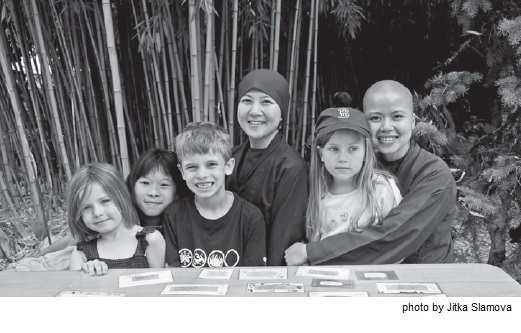
Dear Sangha,
In May 2011, in a Dharma talk at the European Institute of Applied Buddhism in Waldbrol, Germany, Thay shared his vision to bring mindfulness into schools on a large scale. Thay asked us to write to you for your input on, and help with, the preliminary proposal (below). Many of you are already bringing mindfulness into classrooms, and your experience can help us further develop this proposal and guide it in the right direction.

Dear Sangha,
In May 2011, in a Dharma talk at the European Institute of Applied Buddhism in Waldbrol, Germany, Thay shared his vision to bring mindfulness into schools on a large scale. Thay asked us to write to you for your input on, and help with, the preliminary proposal (below). Many of you are already bringing mindfulness into classrooms, and your experience can help us further develop this proposal and guide it in the right direction. Please help us connect with your contacts in the fields of education policy and teacher training, and in educational organizations at local, regional, and national levels.
Proposal for a Course in Mindfulness and Applied Ethics for Educators
This course is offered to educators who wish to cultivate peace and well-being in their own lives and contribute to creating a saner and more compassionate classroom and school environment.
Who We Are
Zen Master Thich Nhat Hanh and the Plum Village community of monastic and lay members have over thirty years of experience practicing and teaching mindfulness and developing a path of ethical living for modern society. We have shared these practices with thousands of people, including teachers, parents, children, social workers, therapists, police officers, health care workers, politicians, businesspeople, and artists, many of whom have become teachers of mindfulness and community-builders in their own right. In particular, we have led hundreds of retreats for families, with children’s and teens’ programs, as well as retreats for educators and students, in which we have developed and refined a rich and effective range of practices for transmitting mindfulness to young people.
Vision
We are now reaching out to those working in the fields of education policy, development, and training at both local and national levels. We wish to collaborate in order to offer regular courses to educators interested in the teaching and practice of mindfulness and applied ethics. We are identifying partners who are ready to implement these courses right away. Initiatives and preliminary explorations are under way with educators and policymakers in several countries in Asia, Europe, and North America.
Aim
This course aims to address the root causes of the suffering and division in our society and in our own hearts. As teachers, many of us see that this is a time of great challenge for young people, who often lack direction and tools to handle the pressures and stresses life presents them. Parents and other caregivers do not get the support they need to provide the essential guidance required for young people to grow up happily and contribute positively to society. Furthermore, many institutions do not provide good examples of integrity, cooperation, or responsible behavior that promotes the good of the whole.
The essence of the course in applied ethics is mindfulness, the energy of being aware of and awake to what is happening inside and around us in the present moment. With this deep awareness, we know what to do and what not to do in each moment to relieve suffering and increase well-being. The methods that we offer in this applied ethics course help us to understand our own bodies, minds, feelings, and perceptions, so we can then help others to do the same. We learn the art of caring for and transforming our suffering and nourishing our joy. Out of this, compassion and a living understanding of our interconnection with our family and society naturally arise.
Secular Foundation
This course is built upon the teachings of the Buddha, but it is non-religious and non-sectarian. Its foundation relies on the insights and concrete practices of Buddhism: interdependence, non-duality, and the intimate connection between happiness and suffering. Scientific evidence has demonstrated that methods arising from the Buddhist tradition are effective and that they can be applied successfully in an educational and secular context without reference to Buddhism. However, if appropriate to the institution or community, the course can be taught from a Buddhist or spiritual perspective.
Course Overview
STAGE I: TAKING CARE OF THE TEACHER
- Cultivating awareness of breathing to help unite body and mind and strengthen concentration
- Caring for our body to reduce stress and pain
- Learning to cultivate feelings of joy and happiness and to appreciate what we already have
- Learning to simplify our lives so that we have more time to relax and enjoy life
- Learning to listen to and embrace our strong emotions, such as fear, anger, anxiety, and despair
- Learning to use loving speech and compassionate listening to care for our relationships
- Exploring non-sectarian, ethical guidelines for our own health and happiness and that of our families, schools, communities, societies, and the world
- Looking deeply into our consumption and production as individuals and as a society
STAGE II: TEACHING MINDFULNESS AND APPLIED ETHICS TO STUDENTS
- Learning to guide sessions of relaxation for students
- Learning to help students recognize and handle strong emotions
- Learning the art of building community so that our classroom and our school can become a loving family environment
- Learning to creatively resolve conflicts in the classroom
- Helping students develop compassion by understanding their own suffering and that of their peers
- Introduction to an age-appropriate mindfulness curriculum, with multi-media teaching materials, that can be applied in the classroom
Course Format
This course is offered in two stages, with each stage lasting one week, held in one of our residential centers or at an academic campus. The course format is organized as a residential retreat, with participants staying overnight and training in mindfulness all day long. Each stage can also be divided up into smaller units of time depending on the need (for example, three weekends or seven day-long segments spread out over time). Stage I is a prerequisite for Stage II.
Community Environment
The course takes place in the unique context of a residential community of monks, nuns, laymen, and laywomen practicing mindfulness twenty-four hours a day. The strength and harmony of the community is grounded upon a shared vision of ethical conduct arising naturally from the practice of mindfulness. The community provides support and creates a safe environment in which we can look afresh at our lives. Living and working together, we generate a powerful collective energy that has the capacity to heal and transform our bodies and minds.
In the course, mindfulness is learned in such a way that we can apply it right away in our daily lives. The residents offer participants their understanding and experience not just through their teaching, but through their embodied practice of mindful speaking, walking, eating, working, and relating. The most supportive environment for our transformation and healing is a harmonious and joyful community. Our thirty years of experience have taught us that community is essential for change to be deep and lasting. Living and practicing as a community, we find trust in the human family and we return to our lives refreshed and enthusiastic. The residential practice environment allows us to open up and rediscover our innate goodness and to bring meaning and direction to our lives.
For more information please contact appliedethics@eiab.eu.
With gratitude,
The Sangha at the European Institute of Applied Buddhism

